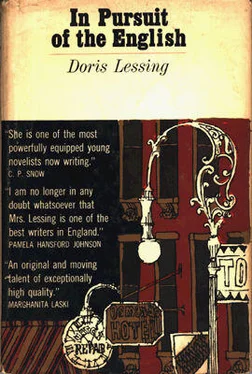‘It’ll be ever so nice for you,’ said Flo, ‘They’re nice men and you won’t be so lonely working away by yourself all day.’
This turned out to be true.
At nine o’clock every morning the men knocked on my door and enquired: ‘Ready, miss? Any dirty work before we start?’
They would then descend to the cellar and carry up coal for me. During that time I had my fire roaring all day and night; I hated so much the thought of going down into the black damp cellar down half a dozen flights of stairs that often I would let it go out and get into bed to read instead.
I had them in my room, three of them, for a month. Two were small, pale, underfed little men who should by rights have been plump and applefaced and amiable, but who were too cautious to do anything but smile, tentatively, and then instantly restore their defensive masks; and their foreman, an offhand, good-humouredly arrogant young man who talked for them all. His name was Wally James, and after he had fetched my coal, we all had a cigarette and many cups of tea. About nine-thirty, he would stretch and say: ‘Well, this won’t keep the home fires burning,’ and in the most leisurely way in the world he set out his tools and began to work.
I gave up all attempts at working, for he would say: ‘That’s right, miss, don’t take any notice of me,’ and start to chat about his wife, his children, the state of the world, and the Government; but most particularly the last two, for he had them on his mind. Eventually I pushed my typewriter away, and we brewed tea and talked.
When this foreman was not there, even if he were out of the room for a few minutes, I would find myself thinking of him as a tall and well-built man, even handsome, for this was how nature had intended him to be. The frame of his body, the cage of his skull, were large, generously defined; but at some time in his life he must have been underfed; for the flesh was too light on gaunt bones, his face was haggard, the eyes deep and dark in their sockets. He had a mop of black hair, rough with bits of dust and plaster; his hands were fine and nervous, but calloused; and the great head was supported on a thin, corded neck.
It took him and his mates four days to remove two panes of glass from my french windows and insert new ones. He assessed the work to last that long; it was what he thought he could get away with. I used to watch him and feel homesick; for I come from a country of accomplished idling.
The memory, perhaps, of a black labourer, hoe in hand, commanded to dig over a flower bed … He saunters out, hoe over his shoulder. He lets the hoe fall of its own weight into the soil and rest there, till, with a lazy lift of the shoulders, the hoe rises again, falls … the man stands, thinking. He straightens himself, spits on his hand and fits it lovingly around the sweat-smoothed wood handle. He gazes around him for a long while. A shout of rage comes from the house. He does not shrug, move, make any sign: he is attacked by deafness. Slowly, the hoe rises, falls, rises, falls. No sign from the house. Leaning on the handle he gazes into the distance, thinking of that lost paradise, the tribal village where he might be lounging at that moment, under a tree, watching his women work in the vegetable garden while he drinks beer. Another shout of rage from the house. Again he stiffens, without actually hearing. The hoe seems to rise of its own accord, and lazily falls, rises and falls, so slowly it seems that some invisible force fights against gravity itself, restraining the hoe in its incredibly lazy down-curve to the soil. ‘Can’t you go any faster than that?’ demands the white mistress from the verandah of the house. ‘What do you think I pay your wages for?’ Why? Well, of course, so that I can pay that stupid tax and get back home to my family … this thought is expressed in the sullen set of the shoulders. By the end of the day he has achieved the minimum amount of work.
Wally James, lazily allowing his chisel to slide over the cracked putty that held the cracked glass in place, remarked: ‘When we put the Labour Government in, we thought things would be better for the working people. But the way things would out, what’s the difference?’
‘According to the newspapers …’
‘Now, miss, you won’t hold it against me, but you don’t want to go reading those newspapers now.’ Scrape, scrape, scrape, scrape. ‘This is a real nice window, say what you like.’
‘It will be, when it’s mended. Been cracked ever since I came in.’
‘You don’t say. Well, next time you just let me know. You don’t want to go wasting time with those forms. Takes it out of a person, those forms do.’ He stood back and looked musingly down into the street. ‘Who’d have thought a working man’s Government would get itself all messed up with forms and such.’
‘I don’t see it’s much worse than the last, do you?’
‘I didn’t say worse, couldn’t be worse, could it? But when we put them in, we meant them to be better.’
‘Surely it’s better.’
‘We-ll,’ he grudgingly admitted, ‘you could say it’s better. But take me. I’ve got a wife and two kids. Two kids isn’t a big family. And my wife works mornings. And I earn eight quid a week. We earn eleven quid between us. Sounds a lot, don’t it? And I can’t afford to take the kids for a holiday, not a proper one. What do you think of that now?’ He scraped a little more, and stood back. ‘Working since I was fourteen. I’m thirty-four. And all the real holiday I ever got was the Army. Join the Army and have a nice rest. My old woman gets mad with me when I say that.’ He lit a cigarette and said: ‘How about a nice cup of char? Can you spare it? If not, I’ll bring you a bit of my ration tomorrow.’
Drinking tea, he remarked: ‘We could do that job in half a morning.’
‘Yes?’
‘Easy.’ He smoked peaceably. ‘Don’t see any point in slaving my guts out and getting nothing back. I’m fed up. What’s the sense in everything?’
‘Don’t ask me.’
‘I’m not asking, I’m telling. When I think of what those boys said before we put them in and what they do now. All the same, once they get in, that’s right, isn’t it, mate?’
‘That’s right,’ assented the other two. They listened to their foreman speaking with detached interest, I got the feeling that if he had made a passionate speech about raising production, they would have assented, with equal indifference: ‘That’s right.’
‘Listen to them,’ he said scornfully. ‘That’s right, they say, that’s right. Not an idea in their bloody heads. Do you know what they are? Slaves, that’s what. And like it. Let me tell you. Last week all the men were complaining about the tea in the canteen. It came cold every time, and the food was muck. There they were, grumbling their heads off. I said, All right then, who’s coming with me to complain to the boss. Oh, yes, they were all coming. The whole bleeding lot. So I walked out of the canteen and went to the office, and when I turned around, where were they? Yes, where were you?’ The two men continued to strip paper off the walls, without turning around. ‘Scared. Can’t talk up for themselves. I said to the boss. We’re sick of the food and the tea isn’t fit to drink. He said: Where’s the men, then? Why don’t they complain. Well, the tea’s better, but no thanks to them. No thanks to you two either.’
At five o’clock, they knocked off. Wally refilled my coal-box, swept out my room, dusted it, asked for another cup of tea. We talked until it was time for me to go to the nursery to fetch my son.
‘You might not know it,’ I said, ‘hut outside this country I know newspapers which say the working people here are getting big wages and are better off than the middle class.’
Читать дальше
Конец ознакомительного отрывка
Купить книгу












